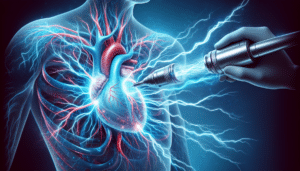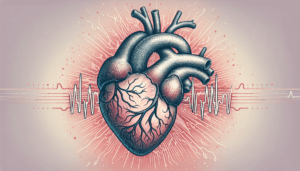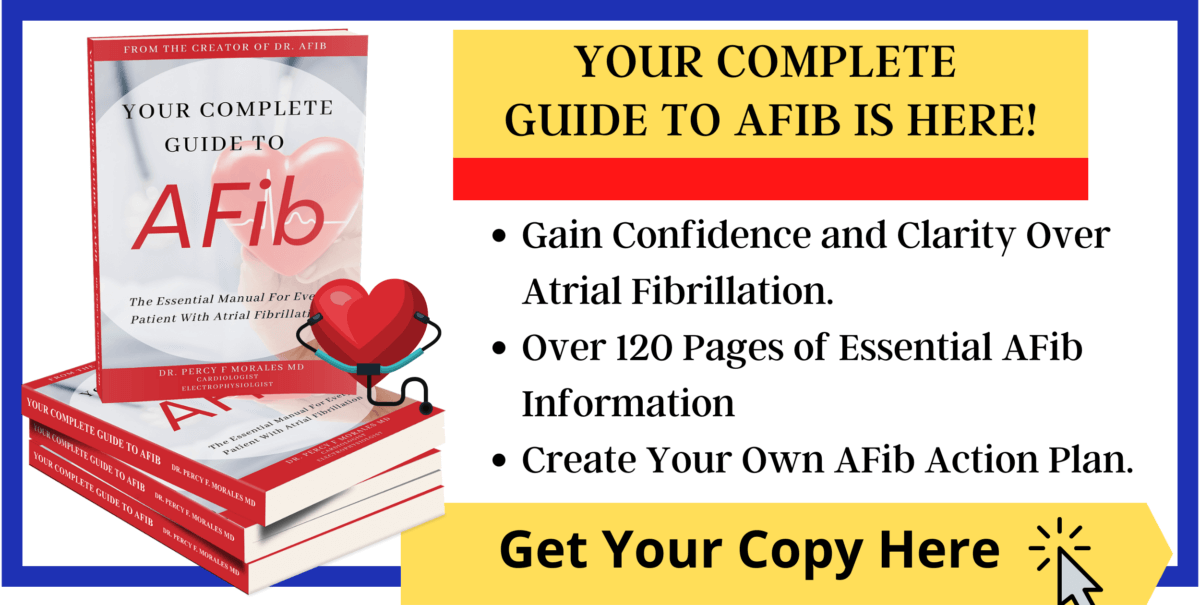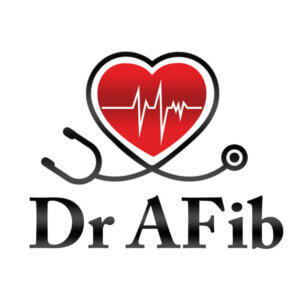If you’re investigating AFib, you’re encountering a complex heart condition that can escalate beyond mere palpitations. This article cuts through the medical maze to explain exactly how AFib affects you, what risks it carries, and what you can do about it. Let’s navigate the world of AFib care and prevention together.
Key Takeaways
- Atrial fibrillation (AFib) is an irregular heart rhythm leading to various complications such as stroke, heart failure, and dementia, with symptoms ranging from palpitations to syncope.
- Diagnosing AFib typically involves an electrocardiogram and can be supplemented with tests like echocardiograms and Holter monitors; treatments vary from medications to non-pharmacological interventions like cardioversion and catheter ablation.
- Preventing AFib involves managing risk factors through lifestyle changes like smoking cessation, limiting alcohol, and adopting a heart-healthy diet; untreated AFib can result in severe complications including an increased risk of stroke and heart failure.
Decoding Atrial Fibrillation (AFib)

Atrial fibrillation, or AFib, is an irregular and often rapid heart rhythm that disrupts normal electrical impulses in the heart, leading to potential complications. The heart’s atria, or upper chambers, exhibit chaotic and irregular beating, becoming desynchronized with the ventricles, the lower chambers. This contrasts with a normal heartbeat, where the atria contract regularly to propel blood to the ventricles, which then contract to distribute blood to the lungs and body.
Complications linked to AFib include:
- Stroke
- Heart failure
- Formation of blood clots in the heart
- Higher risk of developing dementia
- Negative impact on overall lifespan
Your Complete Guide To AFib: The Essential Manual For Every Patient With Atrial Fibrillation
$15.95 $14.35 (as of June 16, 2025 15:14 GMT -06:00 – More infoProduct prices and availability are accurate as of the date/time indicated and are subject to change. Any price and availability information displayed on [relevant Amazon Site(s), as applicable] at the time of purchase will apply to the purchase of this product.)
Unraveling the Symptoms of Atrial Fibrillation
Noticeable symptoms of AFib may include:
- Palpitations
- Fatigue
- Dyspnea
- Chest discomfort
- Lightheadedness
- Instances of syncope
These symptoms are often related to the disrupted blood flow caused by the irregular beating of the heart’s atria. In earlier stages of AFib, individuals might experience paroxysmal atrial fibrillation, where episodes are usually self-terminating and last less than 7 days, but can still cause noticeable symptoms. In more advanced stages of AFib, called persistent atrial fibrillation, patients are in continuous AFIb for over 7 days, usually leading to more prolonged symptoms.
Surprisingly, some individuals with AFib may be asymptomatic and may go undiagnosed until it is coincidentally detected during a physical examination or heart monitoring for other reasons.
The Root Causes of Atrial Fibrillation
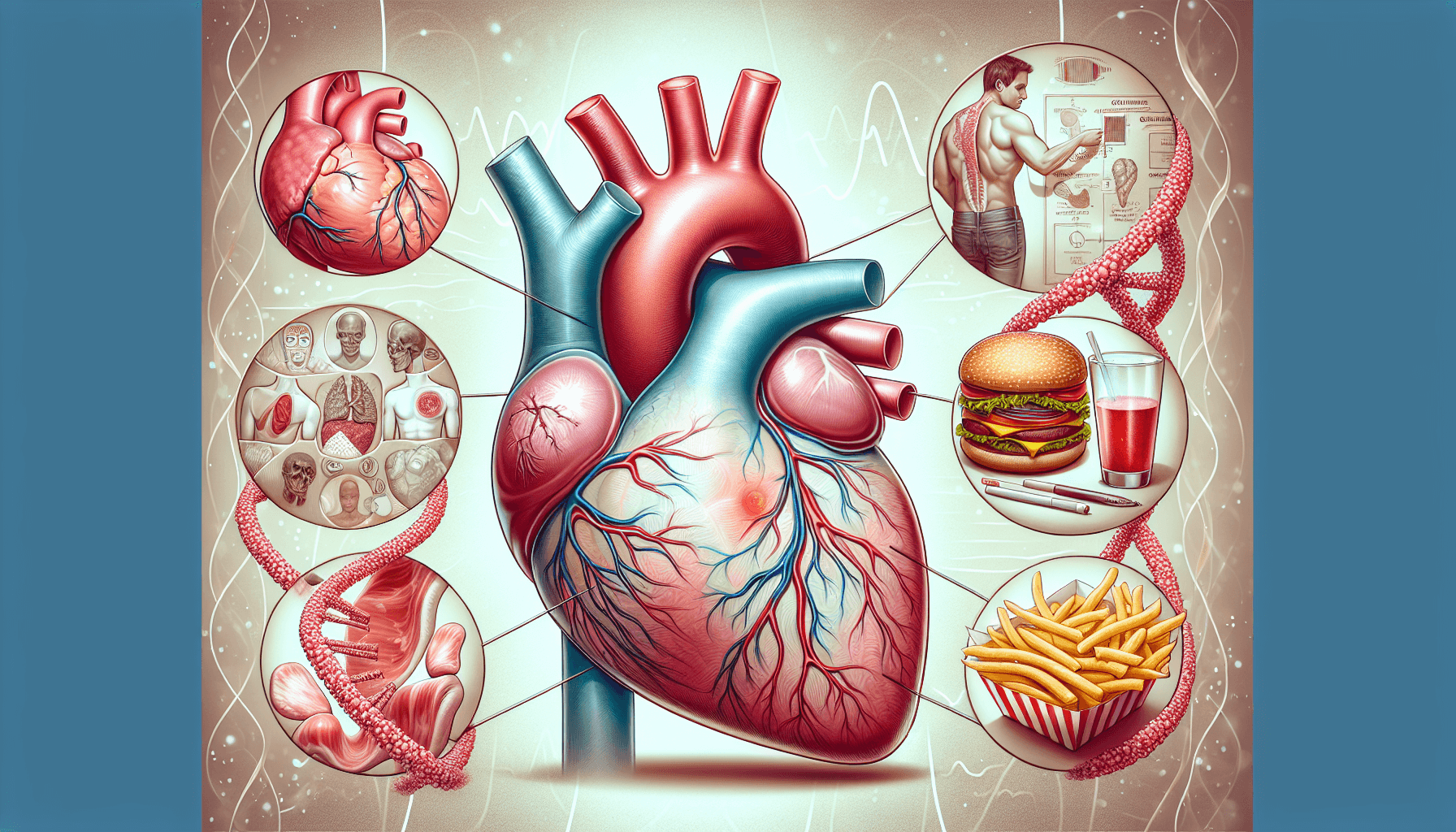
Rapid and irregular beats originating from the heart’s upper chambers result in AFib, often exceeding 400 beats per minute. Frequently, structural issues with the heart like abnormalities in its size or valve problems lead to AFib, and treatment options aim to restore the normal heart rhythm and prevent complications such as stroke and heart failure.
Common causes of atrial fibrillation include:
- High blood pressure
- Coronary artery disease
- Previous heart surgery
- Diabetes
- Smoking
- Excessive alcohol consumption
- Obesity
- Sleep Apnea
Many patients who develop AFib will have one or more of the above listed common causes. However, there are some patient’s in whom the root cause of atrial fibrillation can be difficult to identify.
Identifying AFib: Diagnosis and Tests
An initial suspicion of AFib typically arises during a physical examination when a healthcare provider evaluates the heart rate and rhythm. If an irregularity is observed, an electrocardiogram (ECG) is frequently used for further diagnosis. An ECG is a diagnostic test that involves the placement of electrodes on the chest, arms, and legs to assess the heart’s electrical activity, aiding in the evaluation of heart rhythm and the identification of any irregularities.
In order to enhance the atrial fibrillation diagnosis, supplementary tests may encompass:
- Echocardiogram: for the visualization of heart structure and function
- Stress test: for the observation of heart rhythms during physical exertion
- Extended at home heart monitoring such as a Holter monitor or extended telemetry monitor for several weeks.
At-Home Technology for AFib Detection
With the advancement in technology, detecting sporadic cases of AFib has become increasingly convenient and accessible. Devices like KardiaMobile offer a clinically validated, portable solution to record an EKG anytime, anywhere. This handheld device can capture a medical-grade EKG in just 30 seconds, helping to detect AFib.
KardiaMobile 6-Lead Personal EKG Monitor – Six Views of The Heart – Detects AFib and Irregular Arrhythmias – Instant Results in 30 Seconds – Works with Most Smartphones – FSA/HSA Eligible
13% Off $149.00 $129.00 (as of June 16, 2025 15:14 GMT -06:00 – More infoProduct prices and availability are accurate as of the date/time indicated and are subject to change. Any price and availability information displayed on [relevant Amazon Site(s), as applicable] at the time of purchase will apply to the purchase of this product.)
Similarly, smartwatches have become a popular tool for health monitoring. For instance, the Apple Watch includes an EKG feature that can detect irregular heart rhythms suggestive of AFib. These technologies empower individuals to actively participate in their health management from the comfort of their homes.
Apple Watch Series 9 [GPS 41mm] Smartwatch with Midnight Aluminum Case with Midnight Sport Loop. Fitness Tracker, Blood Oxygen & ECG Apps, Always-On Retina Display, Carbon Neutral
$399.00 (as of June 16, 2025 03:54 GMT -06:00 – More infoProduct prices and availability are accurate as of the date/time indicated and are subject to change. Any price and availability information displayed on [relevant Amazon Site(s), as applicable] at the time of purchase will apply to the purchase of this product.)
Of note, any abnormality on an at home AFib detection device always needs to be confirmed or validated by a doctor’s office.
AFib Treatment Options

The treatment options for atrial fibrillation are diverse and depend on the individual’s health history, symptoms, and preferences. Some individuals may not require extensive treatment if they do not exhibit symptoms. However, when intervention is necessary, may involve pharmacological interventions and non-pharmacological therapies.
Pharmacological Interventions
In managing AFib, medications play a pivotal role. They are utilized to regulate the resting heart rate to a normal rhythm, or improve the heart rate in patients with persistent AFib. Furthermore, anticoagulant medications, also known as blood thinners, are frequently prescribed for individuals with multiple stroke risk factors to mitigate potential complications.
Blood thinners function to prevent blood clots by inhibiting the formation of harmful blood clots in patients with AFib by directly obstructing a protein necessary for blood clot formation. Frequently prescribed anticoagulants for Afib include:
- Warfarin
- Dabigatran (Pradaxa)
- Rivaroxaban (Xarelto)
- Apixaban (Eliquis)
Common medications used to treat the symptoms of AFib include both beta blockers and antiarrhythmic medications.
Beta blockers, such as metoprolol or atenolol, are often prescribed to slow down the heart rate and reduce the force with which the heart muscle contracts, assisting in the management of AFib symptoms. These medications work by blocking the effects of adrenaline on your heart, which slows the heartbeat and helps to lower blood pressure.
Antiarrhythmic medications, on the other hand, work to restore the heart’s regular rhythm and include drugs such as flecainide, sotalol, and amiodarone.
Flecainide is a Class IC antiarrhythmic that works by slowing the electrical signals in the heart, which can help to maintain a regular heartbeat.
Sotalol, a Class III antiarrhythmic, has both beta-blocking and rhythm control properties. It helps to regulate the heart rhythm by slowing the rate at which electrical signals are conducted through the heart tissue.
Amiodarone, also a Class III antiarrhythmic, is often used in more severe cases of AFib. It works by prolonging the phase 3 of the cardiac action potential, which in turn slows the heart rate and restores a regular rhythm. However, it’s worth noting that amiodarone can have significant side effects with long term use, and is generally reserved for when other treatments have been ineffective, or for short term usage only.
Your Complete Guide To AFib: The Essential Manual For Every Patient With Atrial Fibrillation
$15.95 $14.35 (as of June 16, 2025 15:14 GMT -06:00 – More infoProduct prices and availability are accurate as of the date/time indicated and are subject to change. Any price and availability information displayed on [relevant Amazon Site(s), as applicable] at the time of purchase will apply to the purchase of this product.)
Non-Pharmacological Therapies
When medications prove ineffective in managing AFib, surgical procedures may be appropriate. Options may include cardioversion, an electrical shock to the heart aimed at restoring normal rhythm, particularly for individuals experiencing persistent AFib.
Cardioversion involves the use of specialized pads or paddles to administer electrical shocks to the heart, effectively stopping the irregular signals responsible for the quivering of the atria and restoring the heartbeat to its normal rhythm.
Catheter ablation, on the other hand, is a procedure that employs radiofrequency energy or a freezing balloon to eliminate specific areas of heart tissue, including any scar tissue, that could be responsible for causing AFib. This method is particularly useful when other treatments have not effectively controlled the arrhythmia. The procedure is typically performed under general anesthesia. A catheter is carefully threaded through a blood vessel in your leg or neck, and then guided to your heart. Once the problematic heart tissue is identified, it is targeted and destroyed using radiofrequency energy or freezing techniques. The objective of this procedure is to restore normal rhythm and alleviate symptoms, thereby improving the patient’s quality of life.
Read more about a catheter ablation procedure here.
For stroke risk reduction, there’s another procedure called the Watchman device implantation, designed to reduce the risk of stroke in patients with AFib. The Watchman device is a small umbrella-shaped implant that is placed in the left atrial appendage of the heart, a common site where harmful blood clots form in AFib patients. The device effectively seals off the appendage, preventing the migration of any potential blood clots into the bloodstream. This procedure is particularly beneficial for patients who are at high risk for stroke due to AFib, but cannot take long-term anticoagulation therapy.
Read more about the WATCHMAN procedure here.
Both catheter ablation and the Watchman implantation procedure are significant advancements in AFib treatment, offering hope for improved quality of life for patients with this challenging condition.
Managing Risk Factors for AFib
Minimizing the likelihood of developing atrial fibrillation necessitates effective management of lifestyle risk factors, as these adjustments can directly influence the underlying health conditions that make individuals susceptible to AFib. For instance, effective weight management, encompassing weight loss and control of related risk factors, plays a crucial role in mitigating the risk of AFib by enhancing overall heart health and alleviating the burden on the heart.
Smoking and alcohol consumption are other lifestyle habits that significantly impact the risk of developing AFib. Here are some key points to consider:
- Current smokers have more than double the likelihood of developing Afib.
- There is a 16% increase in risk for every ten pack-years of smoking.
- Even minimal alcohol consumption, such as one drink per day, has been associated with an elevated risk of developing AFib.
Complications Associated with Untreated AFib

Severe complications can arise from untreated AFib. It may result in the development of blood clots in the heart, stemming from inadequate pumping of the upper chambers, which significantly elevates the likelihood of experiencing a stroke and other cardiac-related issues.
Moreover, uncontrolled AFib is frequently associated with heart failure, as AFib can contribute to the development of heart failure, and the prevalence of AFib increases as the severity of heart failure progresses.
Additionally, untreated AFib is linked to an increased risk of cognitive decline and dementia, as it can lead to various brain injuries such as stroke, consequently raising the probability of experiencing cognitive impairments.
Strategies to Prevent Atrial Fibrillation

The risk of heart disease can be effectively lowered by making healthy lifestyle choices, as demonstrated by studies. Additionally, these choices may also help in preventing atrial fibrillation (AFib). Some healthy lifestyle choices to consider include:
- Reducing intake of processed foods
- Increasing consumption of fresh vegetables and fruits
- Opting for lean proteins
- Refraining from high-salt, high-sugar, saturated fat, and trans fat foods
- Adhering to a Mediterranean diet
These dietary modifications are highly recommended for maintaining heart health and preventing AFib.
Obesity significantly increases the risk of AFib, and effective weight management, particularly weight loss, can play a crucial role in preventing the onset of AFib and enhancing symptom management. Moreover, even minimal alcohol consumption has been associated with an elevated risk of developing AFib.
Living with Atrial Fibrillation: Lifestyle and Coping
Though living with AFib can pose challenges, a significant enhancement in the patient’s quality of life can be achieved by adhering to the medication regimen and making lifestyle adjustments. Patients can maintain proper medication adherence by adhering to their prescribed regimen, seeking guidance from healthcare providers regarding any concerns or inquiries, and disclosing all other substances they are consuming, such as other medications, herbs, or supplements.
The management of AFib can also be supported by implementing the following lifestyle changes:
- Increasing physical activity
- Minimizing sedentary behavior
- Adopting a heart-healthy diet that is low in salt, saturated fats, trans fats, and cholesterol
- Stress management
Regular medical check-ups are also crucial for monitoring the condition and making necessary adjustments to the treatment plan.
When to Seek Immediate Medical Attention
Emergency medical care should be sought promptly in the presence of severe symptoms such as chest pain, sudden shortness of breath, or signs of severe bleeding. Hence, it is advised to promptly contact 911 (or your local emergency services) if you experience the aforementioned symptoms or observe them in others.
Summary
In conclusion, understanding atrial fibrillation, its symptoms, causes, and management strategies is crucial for effective disease management and prevention. Adherence to medication regimens, regular medical check-ups, and lifestyle modifications can significantly enhance the quality of life for individuals with AFib. It is important to seek timely medical attention for severe symptoms and to maintain regular communication with healthcare providers to ensure optimal management of the condition.
Frequently Asked Questions
What happens if someone stays in AFib?
If left untreated or uncontrolled, AFib can become harder to manage and may lead to severe complications such as blood clots or stroke. It can also increase the risk of heart-related complications like heart failure.
Can AFib be corrected?
AFib cannot be definitively cured, but its rhythm can be controlled with medication, ablation, and blood thinners, along with efforts to lower risk factors.
Can I live a long life with AFib?
Yes, with proper treatment, people with AFib can often lead long, healthy lives, but without treatment, it can lower life expectancy. So, it’s important to seek appropriate medical care.
What is Atrial Fibrillation (Afib)?
Atrial fibrillation, or Afib, is an irregular and often rapid heart rhythm that disrupts normal electrical impulses in the heart, leading to potential complications, such as stroke or heart failure.
The Best Atrial Fibrillation Book
Your Complete Guide To AFib: The Essential Manual For Every Patient With Atrial Fibrillation

Shop AFib Products on Amazon
KardiaMobile 6-Lead Personal EKG Monitor – Six Views of The Heart – Detects AFib and Irregular Arrhythmias – Instant Results in 30 Seconds – Works with Most Smartphones - FSA/HSA Eligible
13% Off
KardiaMobile 1-Lead Personal EKG Monitor – Record EKGs at Home – Detects AFib and Irregular Arrhythmias – Instant Results in 30 Seconds – Easy to Use – Works with Most Smartphones - FSA/HSA Eligible
$79.00 (as of June 16, 2025 15:14 GMT -06:00 - More infoProduct prices and availability are accurate as of the date/time indicated and are subject to change. Any price and availability information displayed on [relevant Amazon Site(s), as applicable] at the time of purchase will apply to the purchase of this product.)
Apple Watch Series 9 [GPS 41mm] Smartwatch with Storm Blue Aluminum Case with Silver Sport Band M/L. Fitness Tracker, Blood Oxygen & ECG Apps, Always-On Retina Display
(as of June 16, 2025 08:46 GMT -06:00 - More infoProduct prices and availability are accurate as of the date/time indicated and are subject to change. Any price and availability information displayed on [relevant Amazon Site(s), as applicable] at the time of purchase will apply to the purchase of this product.)
Fitbit Sense 2 Advanced Health and Fitness Smartwatch with Tools to Manage Stress and Sleep, ECG App, SpO2, 24/7 Heart Rate and GPS, Shadow Grey/Graphite, One Size (S & L Bands Included)
10% Off
OMRON 2-in-1 Upper Arm Blood Pressure Monitor & 1-Lead EKG Monitor - Clinically Validated Blood Pressure Arm Cuff & Machine - Use OMRON Connect App
24% Off
Samsung Galaxy Watch 6 44mm Bluetooth Smartwatch, Fitness Tracker, Personalized HR Zones, Advanced Sleep Coaching, Heart Monitor, BIA Sensor, Health Wellness Insights, Big Screen, US Version, Graphite
$353.21 (as of June 16, 2025 07:34 GMT -06:00 - More infoProduct prices and availability are accurate as of the date/time indicated and are subject to change. Any price and availability information displayed on [relevant Amazon Site(s), as applicable] at the time of purchase will apply to the purchase of this product.)
Natural Rhythm Triple Calm Magnesium 150 mg - 120 Capsules – Magnesium Complex Compound Supplement with Magnesium Glycinate, Malate, and Taurate. Calming Blend for Promoting Rest and Relaxation.
$20.77 ($0.17 / Count) (as of June 16, 2025 07:34 GMT -06:00 - More infoProduct prices and availability are accurate as of the date/time indicated and are subject to change. Any price and availability information displayed on [relevant Amazon Site(s), as applicable] at the time of purchase will apply to the purchase of this product.)
Pure Encapsulations Magnesium (Glycinate) - Supplement to Support Stress Relief, Sleep, Heart Health, Nerves, Muscles, and Metabolism* - with Magnesium Glycinate - 180 Capsules
$44.60 ($0.25 / Count) (as of June 16, 2025 08:46 GMT -06:00 - More infoProduct prices and availability are accurate as of the date/time indicated and are subject to change. Any price and availability information displayed on [relevant Amazon Site(s), as applicable] at the time of purchase will apply to the purchase of this product.)
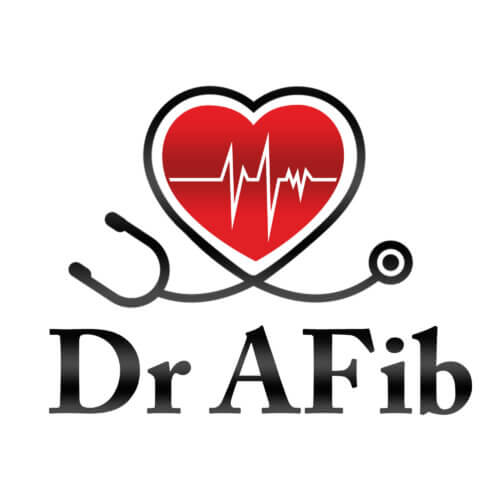









![Apple Watch Series 9 [GPS 41mm] Smartwatch with Midnight Aluminum Case with Midnight Sport Loop. Fitness Tracker, Blood Oxygen & ECG Apps, Always-On Retina Display, Carbon Neutral #1](https://m.media-amazon.com/images/I/41N9IQ1yZIL._SL100_.jpg)
![Apple Watch Series 9 [GPS 41mm] Smartwatch with Midnight Aluminum Case with Midnight Sport Loop. Fitness Tracker, Blood Oxygen & ECG Apps, Always-On Retina Display, Carbon Neutral #2](https://m.media-amazon.com/images/I/41j+8AaUGsL._SL100_.jpg)
![Apple Watch Series 9 [GPS 41mm] Smartwatch with Midnight Aluminum Case with Midnight Sport Loop. Fitness Tracker, Blood Oxygen & ECG Apps, Always-On Retina Display, Carbon Neutral #3](https://m.media-amazon.com/images/I/41uKw5TGcbL._SL100_.jpg)
![Apple Watch Series 9 [GPS 41mm] Smartwatch with Midnight Aluminum Case with Midnight Sport Loop. Fitness Tracker, Blood Oxygen & ECG Apps, Always-On Retina Display, Carbon Neutral #4](https://m.media-amazon.com/images/I/41IpNJERjCL._SL100_.jpg)
![Apple Watch Series 9 [GPS 41mm] Smartwatch with Midnight Aluminum Case with Midnight Sport Loop. Fitness Tracker, Blood Oxygen & ECG Apps, Always-On Retina Display, Carbon Neutral #5](https://m.media-amazon.com/images/I/41fL9+nYWVL._SL100_.jpg)







![Apple Watch Series 9 [GPS 41mm] Smartwatch with Storm Blue Aluminum Case with Silver Sport Band M/L. Fitness Tracker, Blood Oxygen & ECG Apps, Always-On Retina Display #1](https://m.media-amazon.com/images/I/311xwtp4mFL._SL100_.jpg)
![Apple Watch Series 9 [GPS 41mm] Smartwatch with Storm Blue Aluminum Case with Silver Sport Band M/L. Fitness Tracker, Blood Oxygen & ECG Apps, Always-On Retina Display #3](https://m.media-amazon.com/images/I/41jIyxZitnL._SL100_.jpg)
![Apple Watch Series 9 [GPS 41mm] Smartwatch with Storm Blue Aluminum Case with Silver Sport Band M/L. Fitness Tracker, Blood Oxygen & ECG Apps, Always-On Retina Display #5](https://m.media-amazon.com/images/I/31o17yhfYpL._SL100_.jpg)
































